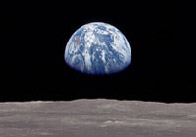 Welcome to The Habitable Planet, a six-part environmental science series co-sponsored by the Friends of the Ashland Public Library and Ashland Farmers Market. This Annenberg Learner course was designed for high school teachers and undergraduate students and features top scientists from many fields.
Welcome to The Habitable Planet, a six-part environmental science series co-sponsored by the Friends of the Ashland Public Library and Ashland Farmers Market. This Annenberg Learner course was designed for high school teachers and undergraduate students and features top scientists from many fields.
All films are held 7-9 pm in the Ashland Public Library, Community Room, 66 Front Street. Admission is free. Viewers are invited to stay for discussion. All ages and all points of view are welcome.
Thursday, May 14 – Part 1 (60 min). Many Planets, One Earth: Examine the unique characteristics that make our planet habitable and learn how these conditions were created. Atmosphere: Discover the fundamental processes that cause atmospheric circulation and create climate zones and weather patterns, and learn how carbon cycling between atmosphere, land, and ocean reservoirs helps to regulate
Earth’s climate.
Tuesday, May 26 – Part 2 (60 min). Oceans: Examines the unique characteristics that make our planet habitable and how these conditions were created. Ecosystems: Learn how scientists study ecosystems to predict how they may change over time and respond to human impacts.
Thursday, June 11 – Part 3 (60 min). Human Population Dynamics: Discover how demographers approach such issues as growth trends and the threat of urbanization on quality of life through the study of human population dynamics. Risk, Exposure and Health: Learn how environmental dangers are assessed, what kind of regulations we use to reduce exposures, and how we manage associated human health risks.
Tuesday, June 23 – Part 4 (60 min). Agriculture: Describes the physical and environmental factors that limit crop growth and discusses ways of minimizing agriculture’s extensive environmental impacts. Water Resources: Learn how water is distributed around the globe; how it cycles among the oceans, atmosphere, and land; and how human activities are affecting our finite supply of usable water.
Thursday, July 9 – Part 5 (60 min). Biodiversity Decline: See how scientists measure biodiversity, how it benefits our species, and what trends might cause Earth’s next mass extinction.
Energy Challenges: Learn about new technologies that can produce ample supplies of energy without some of the environmental costs linked to current energy resources.
Tuesday, July 28 – Part 6 (90 min). Atmospheric Pollution: Discover the basic chemistry of atmospheric pollution and learn which human activities have the greatest impacts on air quality.
Earth’s Changing Climate: Examine the science behind global climate change and explore its potential impacts on natural ecosystems and human societies.
Looking Forward: Our Global Experiment: Examine the wide range of efforts now underway to mitigate the worst effects of man-made environmental change, looking toward those that will have a positive impact on the future of our habitable planet.
